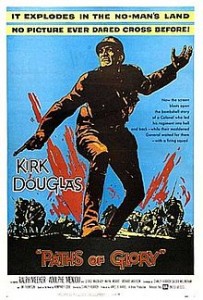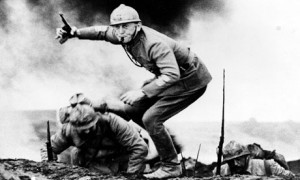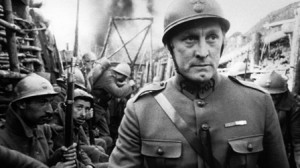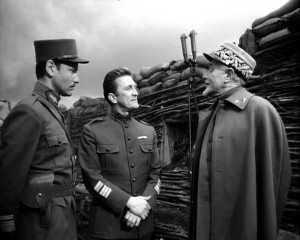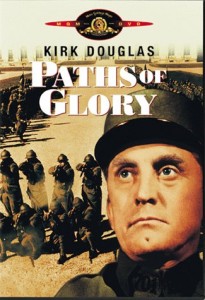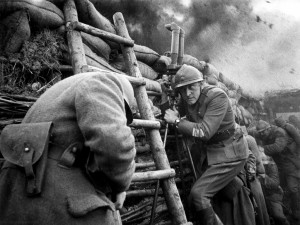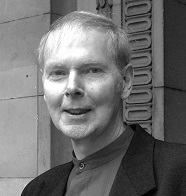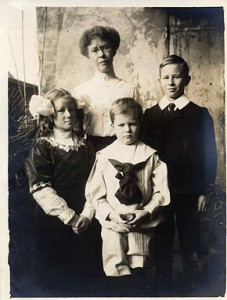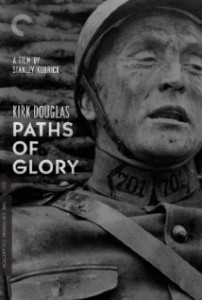Paths of Glory ***** (1957, Kirk Douglas, Adolphe Menjou, George Macready) – Classic Movie Review 1102
In 1957, director Stanley Kubrick confirmed his then growing reputation as one of the most promising film-makers of the era with this harsh, bleak and brilliant, fact-based World War One anti-war film about a French army mutiny that occurs after a regiment is ordered to take an impregnable hill in a suicidal attack. Its re-release in 2014 to commemorate the centenary of the outbreak of the war confirms its status as a masterpiece.
The story centres on the court-martial of three innocent soldiers, unjustly charged with cowardice after the attack fails. They are supposedly picked at random with the intention of executing them as a punishment for the supposed crimes of the whole group, though one of the men is picked maliciously in a hidden agenda.
Kirk Douglas shows his subtle, finely-honed acting skills in one of his finest performances as the 701st Infantry Regiment’s idealistic commanding officer, Colonel Dax, a top criminal defence lawyer in civilian life, who attempts to defend the French soldiers against the charges of cowardice in a court-martial. Douglas really is powerful, credible and moving, and he excels himself here.
Adolphe Menjou is remarkable as the little-comprehending but complacent, cunning and conniving chief officer General Georges Broulard, while George Macready is also memorable as his subordinate, the stern, ambitious, old-style army man General Mireau, whose ridiculous stupidity, obstinacy and outmoded ideas precipitate the tragedy.
Also notable are Wayne Morris as a drunken lieutenant named Roget, as well as Ralph Meeker as Corporal Paris, Timothy Carey as Private Ferol and Joe Turkel as Private Arnaud, who are the three innocent soldier victims court-martialled. The three actors carve out unforgettable characters in relatively little screen time. There were 68 takes of the convicted, doomed men’s last meal scene, but the compelling final result is worth it.
The screenplay incisively dissects the high-handed, quietly vicious callousness of the French leaders and has a strong take on the appalling theme of the French military’s random execution of innocent men to strengthen others’ resolve to fight. There’s a strong stench of anti-French feeling in the movie, as it’s made by Americans and in Germany too. It’s unthinkable that Americans would have made a film about British atrocities in World War One at this time in the Fifties. It was duly banned in France at the time for its negative portrayal of the French army and its exhibition prohibited until 1975.
Kubrick also vividly conveys the horrors of trench warfare and of battle in the World War One. The long, fluid tracking shots along the trenches are brio stuff that put the audience totally in the space. The amazingly realistic epic battle sequence is brilliantly staged by Kubrick. It looks incredible still and has a gut-thumping impact. It was filmed in a 5,000 square yard pasture rented from a German farmer. The production team moved in with eight cranes and 60 crew members working around the clock for three weeks to create trenches, shell holes and the rough, muddy terrain of a World War I battleground.
Based on Humphrey Cobb’s 1935 factual novel, the screenplay is written by Kubrick, Calder Willingham and the noir thriller writer Jim Thompson. Kubrick decided to adapt it for the screen after he remembered reading the book when he was younger. Kubrick and his partners bought the film rights from Cobb’s widow for $10,000.
Cobb’s novel had no title when it was finished, so the publisher held a contest. The winning entry came from the ninth stanza of Thomas Gray’s famous poem Elegy Written in a Country Churchyard: ‘The boast of heraldry, the pomp of pow’r, And all that beauty, all that wealth e’er gave, Awaits alike th’inevitable hour. The paths of glory lead but to the grave.’
It was all made in Bavaria, Germany, mainly at the Schleissheim Palace near Munich, as well as at the Bavaria Filmstudio, Geiselgasteig, Grünwald and Pacaria-Filmkunst Studios, Munich. Timothy Carey was fired during production and replaced with a double. The film cost under $1million and broke even, a big achievement for a film that had little commercial prospect.
After the real-life soldiers were executed for mutiny in Souain, France, their families sued and, though the executions were ruled unfair, two of the families received one franc each, while the others received nothing.
The only female character in the film, the young German woman who sings the haunting The Faithful Hussar to the French troops at the film’s enigmatic ending, is portrayed by German actress Christiane Harlan (credited as Susanne Christian). She later married Kubrick, and they remained married until his death in 1999.
Christiane Kubrick with Stanley Kubrick and her three daughters, 1960.
Kubrick worked next with Douglas again on Spartacus (1960).
RIP Kirk Douglas. His son Michael Douglas said on 5 February 2020: ‘It is with tremendous sadness that my brothers and I announce that Kirk Douglas left us today at the age of 103. To the world, he was a legend, an actor from the golden age of movies who lived well into his golden years, a humanitarian whose commitment to justice and the causes he believed in set a standard for all of us to aspire to.’
http://derekwinnert.com/spartacus-classic-film-review-122/
http://derekwinnert.com/dr-strangelove-classic-film-review-209/
http://derekwinnert.com/eyes-wide-shut-classic-film-review-269/
© Derek Winnert 2014 Classic Movie Review 1102
Link to Derek Winnert’s home page for more reviews: http://derekwinnert.com/
Paths of Glory author Humphrey Cobb, above right, is seen with his family December 24 1908 at the Casa Guidi in Florence, Italy. He poses with his younger sister Virginia, brother Arthur and recently widowed mother Alice Littell Cobb MD.

